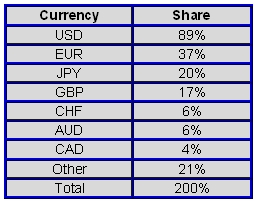The Very Basics
ISO Codes
Currencies, as stocks, are not referred by their full name; they are standardized for easier reference.
The International Standardization Organization (ISO) developed what is called ISO Codes for Currencies. The ISO currency codes are made of three letters:
The first two letters represent the abbreviation of the country of each currency, and,
The last one represents the first letter of the country’s currency (dollar, franc, etc.)
Currencies can also be called by their nickname.
ISO Codes for the Majors

[Table 1]
* CHF, CH stands for Confederatio Helvetica, the Latin translation. This avoids choosing one of the four official languages in Switzerland.
The seven major currencies
Form all the transactions involved (volume) in the Forex market, 85% is produced by the seven majors (see table below).
Trading volume by currency*

[Table 2]
Source: Bank of International Settlements (BIS)
*Since 2 currencies are involved in each transaction it totals 200%
Currency Pairs as Instruments
It is easier to consider currency pairs as main instruments. For instance, you are expecting the EUR to appreciate; you go long EUR (EUR/USD). What you are doing here is buying the EUR and selling the USD. But it is not practical to view it that way. It is easier to consider the EUR as the main instrument, so that you will only say “I am long Euro”.
On the other side, if you are expecting the dollar to appreciate. You will go short EUR (EUR/USD) here you are selling the EUR and buying the USD. You would say here, “I am short EUR”.